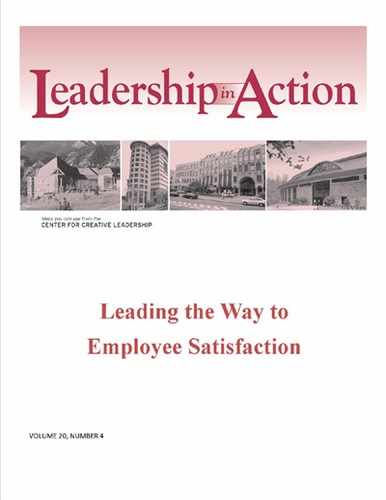The Satisfaction Gap
An examination of the results of the Campbell Organizational Survey™ (COS™) found that the people who worked for the managers in the highest-performing quartile generally were more satisfied with the company's culture, leadership, benefits, and other aspects of work life than were the subordinates of managers in the lowest-performing quartile. Specifically, on sixteen of the eighteen COS scales, the employees two levels down from the highest-performing managers in the middle- to upper-management group reported greater levels of satisfaction than did the subordinates of the less effective managers. In the group of senior executives, the subordinates of the highest-performing managers gave higher satisfaction scores on thirteen scales than did the employees who worked for the lowest-performing executives. The overall satisfaction index scores of both groups were higher for the subordinates of the more effective managers.
Cause and Effectiveness
This article is based on research that CCL conducted with a major manufacturing company. Over a period of three years, the company sent groups of managers through two CCL development programs. One program is similar to the Leadership Development Program (LDP)®, which helps middle- to upper-level managers become more successful and productive in their professional and personal lives and shows them how to develop some of the capacities—such as self-awareness—needed for effective leadership. The other program is similar to Leadership at the Peak (LAP), which uses methods such as discussion, simulation, feedback, and role-playing and problem-solving exercises to help executives at the very top of organizations evaluate and enhance their leadership skills.
The managers who attended the first program took Benchmarks®, CCL's comprehensive, 360-degree assessment tool that identifies strengths and areas in need of development, encourages and guides change, and offers strategic insights for middle- to upper-level managers. Those who attended the second program took the Executive Success Profile, a similar 360-degree assessment instrument from Personnel Decisions International that is intended for senior executives.
The two sets of managers were then evaluated on their effectiveness in categories selected by the company as important for success and were ranked according to their scores. The research on the relation between managerial effectiveness and employee satisfaction continued with the managers who placed in the highest and lowest quartiles.
Before attending the CCL programs, the managers had taken the Campbell Organizational Survey™ (COS™), an attitude survey from National Computer Systems that gathers information on employees' feelings of satisfaction or frustration with various aspects of their work and organizations. The managers also asked their subordinates two levels down to complete the survey. The COS asks questions about seventeen categories, or scales, of organizational climate, such as working conditions, job stress and its effects on employee health and productivity, the skills and fairness of supervisors, and the dynamism and vision of top leaders. One outcome of the survey is an overall satisfaction index, a broad measure of each participant's satisfaction with the organization's working climate that is based on a compilation of responses. Because this instrument has been standardized across eighty-four organizations and more than 6,700 individuals, it allows comparisons among diverse companies and work groups.
It's important to note two things about this research. First, the managers of the manufacturing company that was the subject of the research are in general highly effective. These managers scored above the norm on their respective assessments, and the difference in performance between those who placed in the top quartile and those in the bottom quartile was small. This indicates that even slight differences in managerial effectiveness can have a significant impact on subordinates' satisfaction with organizational climate. Second, a look at the standardized data for the COS shows that the general levels of satisfaction among employees of the manufacturing company are typical when compared with those of employees of other organizations. However, the subordinates of the lowest-performing managers in this manufacturing company were found to be less satisfied on eleven of the eighteen scales compared with subordinates of managers in other organizations. The subordinates of the more effective managers were less satisfied on only two scales. This again shows that even small variations in managerial performance can significantly affect employees' perceptions of the organization.
Even slight differences in managerial effectiveness can affect subordinates' satisfaction with organizational climate.
